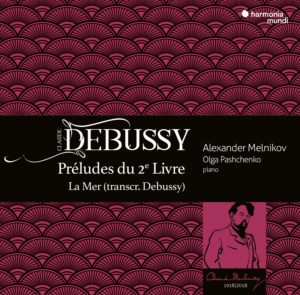The 1885 Erard piano used in this recording of Debussy’s Preludes Book II stands out for the distinct character of its sonorities in different registers (a mellifluous middle register, a twangy bass, and so forth), plus its capacity to produce a wide variety of sustain effects from the pedal. I also suspect that the keyboard action is light and responsive. Certainly Alexander Melnikov exploits the instrument to his artistic advantage, and Debussy benefits as a result.
In Brouillards, for example, the slurred staccato left-hand chords and right-hand arpeggios sound as if they’re originating from two different instruments. Given the relatively short decay of the Erard’s sustain pedal compared to modern concert grands, Melnikov’s pedaling through harmonic changes in Feuilles mortes (and elsewhere) never sounds muddy. Melnikov’s strict adherence to the dotted rhythm of La puerta del Vino’s left-hand ostinato is too rigid and unyielding for what this lilting and sexy music implies, in contrast to his spot-on timing of Les fées sont d’exquises danseuses’ capricious tempo shifts and gorgeous chains of trills. He also nails the quirky lilt of General Lavine’s cakewalk to idiomatic perfection.
Ondine shimmers in alluring half-tints, relieved, however by the occasional spiky accent. My only quibble concerning Hommage à Pickwick is that Melnikov begins the dotted-rhythm sequence at measure 31 too loud, and retains a steady tempo instead of following Debussy’s request to gradually get faster. But what beautifully controlled diminuendos in the plaintive melodic lines in Canope’s last measures, and what magically agile alternating thirds in No. 11, not to mention Feux d’artifice’s supple and sparkling runs.
Olga Pashchenko joins Melnikov for Debussy’s own four- hand arrangement of La Mer, in a scrupulously synchronized performance full of bristling detail and colorful allure. Low-lying tremolos that can sound muddy and boring on a modern piano emerge more texturally varied and transparent on the Erard, while Melnikov and Pashchenko deftly accommodate each other in regard to balancing foreground and background material, yielding far less cluttered and monochrome results than is often the case in recordings of symphonic repertoire arranged for piano duet. Highly recommended.
































